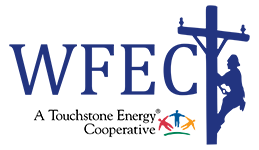Current Light Flashes
The official voice of West Florida Electric Cooperative:
In this issue:
Spreading Christmas Cheer: Community Charity Project Helps Local Foster ChildrenLet WFEC Help Power Your Future
Smith Earns HSI Instructor Level 1
Take Control of Your Bill with EZ Pay Power
Make Your Holidays Merry, Bright and Energy Smart
In this issue:
Thinking About Rooftop Solar? Start with WFECWFEC Welcomes Nathan Berry as New Executive Vice President & CEO
Changes at Your Cooperative
Evans Earns Prestigious SHRM Certification
Upgrade and Save with a Manufactured Home Rebate
Delays Don't Get in the Way of Monumental D.C. Days
Classifieds - August 2025
In this issue:
Quickly and Easily Report Power OutagesRecent Substation Work Aims to Improve Reliability and Weather Resilience
Energy Can Spread Like Ripples on a Pond
Classifieds - May 2025
Who Runs the Cooperative Business: Part 4
WFEC Lineman Creates Bold New Logo for Co-op
Special Needs Registry Program
West Florida Electric members are great cooks! Check for new recipes every month.

